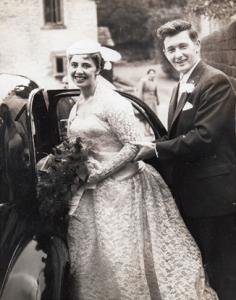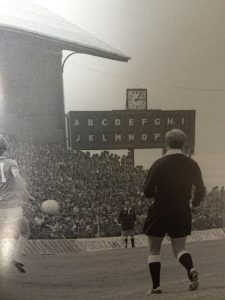Jeff Hall – A tragic loss with a positive effect
BY Vince Cooper
Jeff Hall was an England international footballer and, in the eyes of many, the best right-back in the country during the late 1950s. Then he contracted Polio and tragically lost his life, bringing about a huge upsurge in the number of youngsters being vaccinated against the disease and, in all probability, saving many lives.
Hall was born in Scunthorpe, Lincolnshire but when he was just a few days old parents Percy and Minnie moved Wilsden, a small village in Yorkshire to help Percy’s sister run a pub, The New Inn.
This was where Jeff grew up and where he would start playing for local junior teams before stepping up to join Bradford Park Avenue. He never turned pro at the club and was yet to make a first-team appearance when he was called up for National Service.
While serving with the Royal Electrical and Mechanical Engineers, and playing in an army match, Hall was spotted by Birmingham City chief scout Walter Taylor. “The player I went to watch didn’t shine but I was taken with the play of the right-half” Taylor would later recall. That right-half was Hall so Taylor had a chat with him. “At first he didn’t think he was good enough and it took me hours to persuade him to sign amateur forms.” Said the scout.

He joined the club in February 1950 and turned pro three months later. Converted from right half to right back Hall took some time to break into the first team at City, making his debut in January 1951 but not finally cementing his place in the line-up until two years later. He did have a few outings at outside-right, as an injury replacement for Jackie Stewart and scored his first, and what would prove only senior goal against Stoke City in 1953
In 1954-55 he was part of the City team that won the Second Division title and was also a key member the following season when City finished 6th in the top flight and reached the FA Cup Final where they were beaten by Manchester City in the match made famous by the injury to City goalkeeper Bert Trautmann.
Hall was well known for his consistency and also for his humility. Even when he had reached the pinnacle of the national game he would still help out in the family business by delivering newspapers when he went home to visit his parents.

Jeff Hall lines up for England next to Stanley Matthews
Also in 1955-56 Hall received his first international recognition when he was called up to play for England B. He broke into the England first team for the 5-1 win in Denmark and made the right back place his own, playing every one of the next 16 internationals, only one of which was lost.
In each of his 17 starts for his country, Jeff’s full back partner was Roger Byrne of Manchester United, at the time a record for a full-back partnership. Tragically, both would pass away before their 30th birthday.
On 21 March 1959 Hall played for City in a First Division match at Portsmouth. The appearance was his 229th for the club and the game against their relegation-threatened rivals ended in a 1-1 draw.
The night before the game Hall had complained of having trouble swallowing and at the end of the match he again complained of feeling unwell begging a lift from some of his teammates in a private car rather than travel back to Birmingham on the team coach.

Jeff up against Don Revie in the 1956 FA Cup Final
On the Sunday he went to watch the junior side he helped train as they played in a five-a-side tournament where they came up against a side coached by Don Revie whom Hall had opposed in the 1956 Cup Final. But the following day he felt worse again and was admitted to hospital where he was quickly diagnosed with polio and placed in an iron lung.
Over the following 12 days his condition deteriorated rapidly and on 4 April, despite three operations within 24 hours of admission he passed away aged just 29 at 9:20 a.m. on April 4th 1959 at Little Bromwich hospital, a mere fortnight after his final match. Hall’s wife of 18 months Dawn who had visited him four times a day since he was admitted, and his parents were at his bedside.
Birmingham who hadn’t played since he was first diagnosed called off their match at Newcastle a day later and players in all football league matches wore black armbands.
”Jeff fought his illness as he fought on the football field”, said Birmingham trainer Ken Fish. “With tremendous purpose”.
City centre-half Trevor Smith said of his teammate; “Though he was a wonderful player, the whole team will miss him more off the field”.
After learning of his death, Billy Wright, his England captain who had also become a good friend said: “Not only Birmingham City but the whole of English football will be the poorer now that Jeff has left us.
“After playing with him for England on numerous occasions and being associated with him off the field, I know just what a wonderful player and person he was.”
Birmingham City, and the clubs they had faced prior to and including the Portsmouth match immediately placed their players into quarantine whilst staff at the hotel the club had used on the South coast were also put into isolation.
Dennis Howell M.P. for All Saints, Birmingham and a football referee called for the vaccination scheme, then available for those up to the age of 25, to be extended to include all sportsmen and said: “People who are in a state of physical fatigue are especially vulnerable to the disease. Sportsmen are frequently in this condition”.
Hall’s funeral took place five days after his death in his home village of Wilsden and on the same day a memorial service took place at St Andrews church next to City’s ground.
Hall’s passing sparked a huge change in public perception of the deadly Polio disease, and of the need for inoculation. Within days thousands were queueing to receive the vaccination and the lines grew longer when widow Dawn appeared on television to talk about her tragic loss.
Prior to Hall’s tragic death only around half of the children eligible for the vaccination had received it. But by 20 April clinics were reporting that they had run out of the vaccine causing a rush shipment of fresh supplies from the U.S. to meet demand.

Dawn and Jeff Hall on their wedding day
Dawn also made a recording which was translated into a number of different languages and distributed around the world. Speaking later, she said; “I didn’t want Jeff’s death to be in vain and I certainly didn’t want anyone else to go through the same ordeal.
‘I went on television to talk about my experience and to tell everybody in the country how important it was to be immunised.”

The original Jeff Hall Memorial clock and scoreboard
Dawn continued to campaign and help victims of polio right up until her death at the age of 79 and was posthumously awarded the British Empire Medal. Her husband is still remembered by a Memorial clock now on top of the main stand at St Andrews, the home of his only professional club, after originally being part of the scoreboard.

Dawn Hall – later Clements
The death of Jeff Hall went a long way towards helping people in Britain and worldwide to understand to threat of the deadly polio virus and to take action, encouraging many to be vaccinated.
It is impossible to estimate how many lives were saved due to Jeff’s tragic passing and Dawn’s relentless campaigning but it is fair to say that the raising of awareness of the deadly nature of the disease, along with how easily it could be guarded against was hugely affected, and for that, this is one of football’s generally unknown stories that deserves re-telling.

